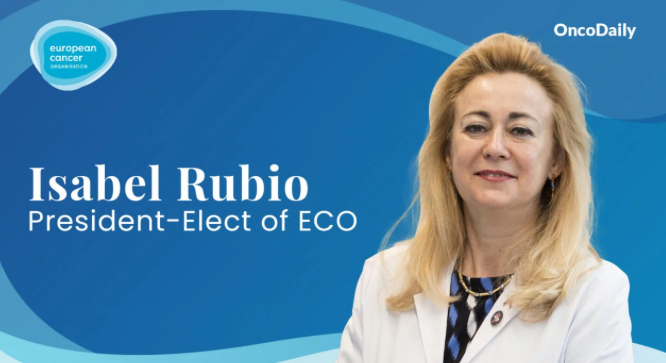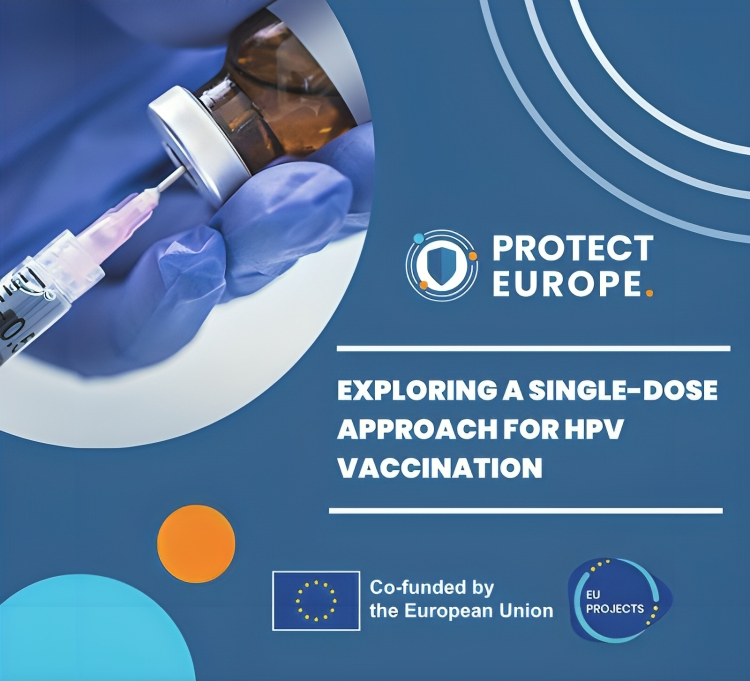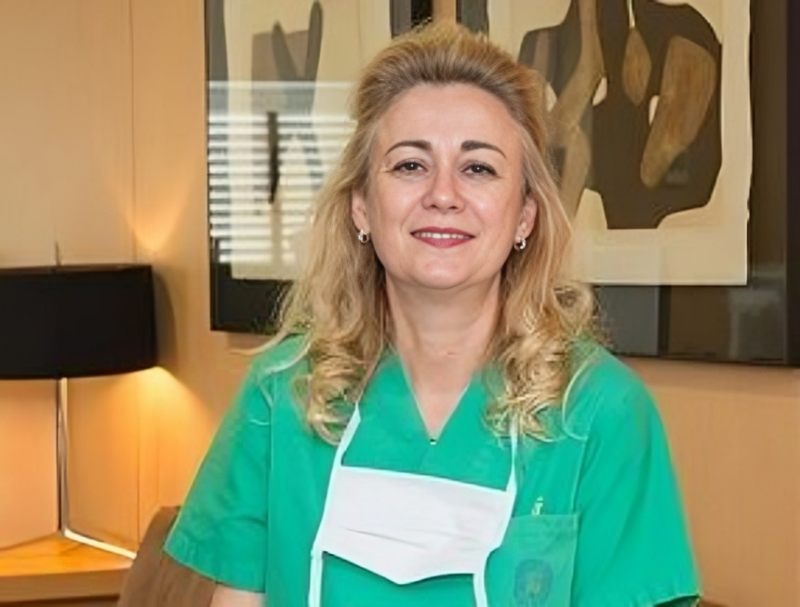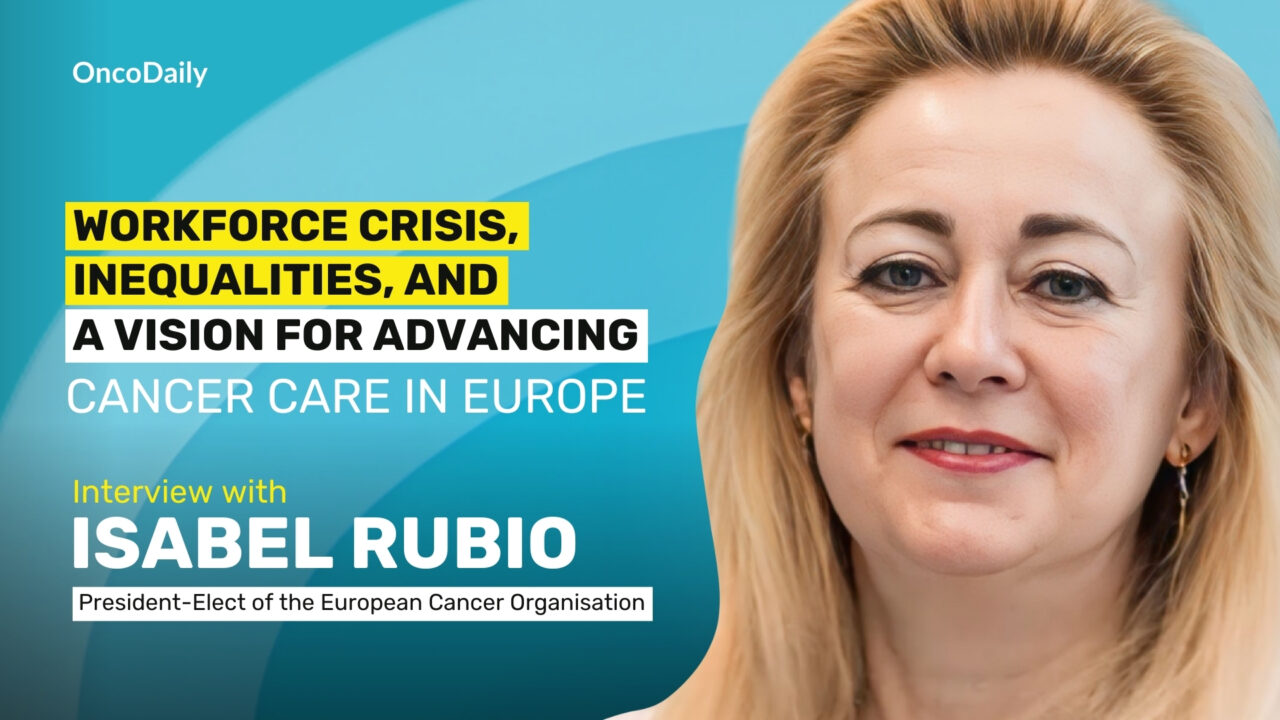In this interview, Dr. Isabel Rubio, President-Elect of the European Cancer Organisation (ECO), shares her insights on tackling some of the biggest challenges in cancer care today.
Collaboration, strategic resource allocation, and empowering patients are central to her vision for shaping the future of oncology across Europe.
Implementation of Europe’s Beating Cancer Plan: A Central Vision
Reflecting on her new role as President-Elect, Dr. Rubio emphasized the critical importance of Europe’s Beating Cancer Plan and the finalization of its implementation as her primary focus for the coming years.
“Our main goal in the next two years will be to finalize the implementation of the Europe Beating Cancer Plan across member states. If the recommendations—starting from prevention and extending through survivorship—are not implemented, the Plan won’t become the reality we expect it to be.”

Tackling Key Challenges in Oncology Through the Initiatives of the European Cancer Organisation
When asked about the pressing challenges in oncology, Dr. Rubio acknowledged the complexity of the task, emphasizing the importance of a step-by-step approach.
“I think there are many challenges, and we probably need to look into them step by step. The European Cancer Organisation has 9 Focused Topic networks to facilitate consensus and joint projects in any step of the cancer patient journey, to be able to go through all the challenges that would be impossible to achieve without it,” she explained.
Dr. Rubio highlighted the significance of European Union-funded projects in driving progress. “We will expect the finalizing of some of the European Union-funded projects like the smartCARE (a cancer survivor smart-card) and PROTEC-EUROPE (gender-neutral HPV vaccination programme in EU member states) that will be updated at this Summit,” she noted.

However, the work doesn’t stop there. “We keep going on trying to be part of these funded programs that will help with the implementation of the Europe beating Cancer Plan.”
While prevention remains a cornerstone of cancer care, Dr. Rubio underscored the need for continuity throughout the care pathway.“Prevention is the most cost-effective strategy, but prevention also needs to be followed with continuous care. So, we can get more early detection across all cancer types, but if we don’t follow a program to implement and to improve access to treatments—surgical, radiation therapy, medical treatments—then, you know, we will be stuck in the next step,” she explained.
This highlights the interconnected nature of the oncology care pathway, where progress at one stage must be supported by advancements at the next.
Dr. Rubio also addressed one of the most pressing issues in European cancer care: inequality.
“Of course, you know, one of the huge problems in Europe and inside the member states are the inequalities in access to screening programs, to treatments, to any cancer care,” she stated.
Bridging these gaps, she argued, requires targeted efforts across all stages of the patient journey, from prevention and early detection to treatment and survivorship.
Through these initiatives and a deliberate, phased approach, the European Cancer Organisation aims to tackle the challenges facing oncology, ensuring meaningful improvements in cancer care and equity across Europe.
Addressing these challenges, the European Cancer organization has developed the Women and Cancer workstream that addresses and provides action points about the unique inequities faced by women who experience a cancer diagnosis, women working in the cancer sector, and women caregivers.
Collaboration Through Data: A Cornerstone of Progress
Dr. Rubio highlighted the essential role of data in transforming cancer care across Europe, emphasizing its necessity for driving evidence-based improvements at every step of the patient pathway.
“I think that one of the main issues that we need to have is real world data to have real world evidence—to understand patterns of cancer, access to care and treatment outcomes in order to improve cancer care,” she stated.
She underscored the importance of national cancer registries as a cornerstone of this effort. “It’s imperative that the member states—those that already have registries—continue improving them, but for the member states that do not have cancer registries, speed up the process and allocate resources to establish them,” she urged.
These registries will also contribute to sharing data across borders, by which member states can collectively advance their understanding of cancer care and create a stronger foundation for decision-making.
“In that way, we can share the data between all the member states if we want to get any information and evidence base for any step in the pathway of the patient,” she explained.
Addressing Workforce Shortages in Oncology at a Pan-European Level
Workforce shortages in oncology are one of the most pressing issues affecting cancer care across Europe. Dr. Isabel Rubio highlighted the gravity of the situation, drawing from the findings of ECO’s workforce network and survey.
“Fifty percent of healthcare professionals feel that their employers are not taking care of their well-being,” she noted, emphasizing how this systemic neglect directly impacts burnout, retention, and patient outcomes.
Dr. Rubio stressed that the current approach—placing additional work on an already overburdened workforce – is unsustainable. “If there is a lack of professionals, and the idea is to give more work to the ones already there, the burnout will increase, and sick leaves will be much higher. This is not the way to go,” she said.
She also pointed out the impending retirement of a significant number of specialists, particularly radiation oncologists and pathologists, leaving gaps that the current workforce pipeline is ill-equipped to fill.
“We are facing a dangerous reality: there aren’t enough specialists to replace those who are retiring,” she added.
Another critical challenge lies in the inefficiencies of current workflows. “Doctors and nurses are overloaded with paperwork,” Dr. Rubio explained. “They are not data managers, nor should they be. Their mission is to take care of patients.”

She advocated for hiring dedicated data managers within cancer centers to manage documentation, freeing up clinicians to focus on their primary responsibilities.
“If we continue to expect healthcare professionals to fill data, it will only worsen the workload crisis.”
Inequalities in Cancer Care: Evidence, Challenges, and Actions
Dr. Isabel Rubio highlighted the critical issue of inequalities in cancer care, emphasizing how disparities persist across Europe, both between member states and within regions of the same country.
Drawing on insights from the European Cancer Organisation’s Cancer Pulse report, she stated, “We find out that the reality is that there are many inequalities between member states, but also in each country, between different regions of the country. And this is something that we already know, and we have data to prove it.“
The study identified underserved populations that face significant barriers in accessing cancer care, including those from low socioeconomic backgrounds and those affected by gender biases.
“Now we have identified what is not working. The next step is how we can approach this,” Dr. Rubio explained. She pointed to disparities in the approval of medications, the lack of specialization in cancer surgery, and limited access to high-quality surgical care as key areas requiring attention.
“Not all patients can access high-quality cancer surgery. We know that will not only affect oncological outcomes but also the quality of life of the patients if they have suboptimal surgeries.”
Dr. Rubio also stressed the role of legislation in addressing preventable cancers and reducing disparities. “We see the difference between the Eastern and Western countries in Europe,” she noted. “In the end, there is a need for legislators to make laws regarding tobacco, air pollution, screening, and other factors.”
She highlighted the modifiable nature of many cancer risk factors, including smoking, environmental pollutants, and poor lifestyle habits. “We know that there are many cancers that can be prevented by modifying these risk factors,” she explained. Stronger legislative actions at the national level, coupled with public health initiatives, can pave the way for significant reductions in cancer incidence.
Redefining the Patient-Centered Approach
ECO’s commitment to patient-centered care is at the heart of its mission. Dr. Rubio highlighted the organization’s 33 member societies and its active Patient Advisory Committee. “We cannot change anything if we don’t listen to patients,” she asserted. “The phrase ‘nothing about me without me’ is embedded in our approach.”
Patient input, she explained, is essential not only for understanding needs but for driving meaningful change.
“Patient-centered care doesn’t just mean focusing on the patient; it means involving them in decision-making and listening to their perspectives. This collaboration ensures that policies and practices align with real-world needs.”
Implementation of Europe’s Beating Cancer Plan: A Benchmark for Success
Dr. Isabel Rubio underscored the importance of sustained collaboration and funding in successfully implementing the Europe Beating Cancer Plan.
“If we can keep collaborating with all the societies, with the European Commission, in terms of having more European funding projects that will improve the implementation of the European Cancer Plan in the different member states, I will be very glad that we have succeeded in what our mission of the implementation of the Europe Beating Cancer Plan was,” she stated.
Dr. Rubio highlighted the fundamental role of health in human life and reiterated the need to keep cancer at the forefront of political and health agendas.
“Health is one of the most important parts of human nature. And I think that cancer needs to keep being in the front line of policy at the European and Member States level because this is the only way to finalize the implementation or at least look toward the nearest end of the implementation of the European Cancer Plan meaning that there will be an improvement in prevention and cancer care,” she explained.
Dr. Rubio’s vision is clear: through collaboration and a shared commitment, it is possible to achieve high-quality cancer care while reducing inequalities across Europe.
“United, we can achieve what we want. And we can achieve high-quality cancer care and reduce inequalities in the cancer approach.”
Her words serve as a reminder that the path to better cancer care begins with collective voices demanding change and action.


